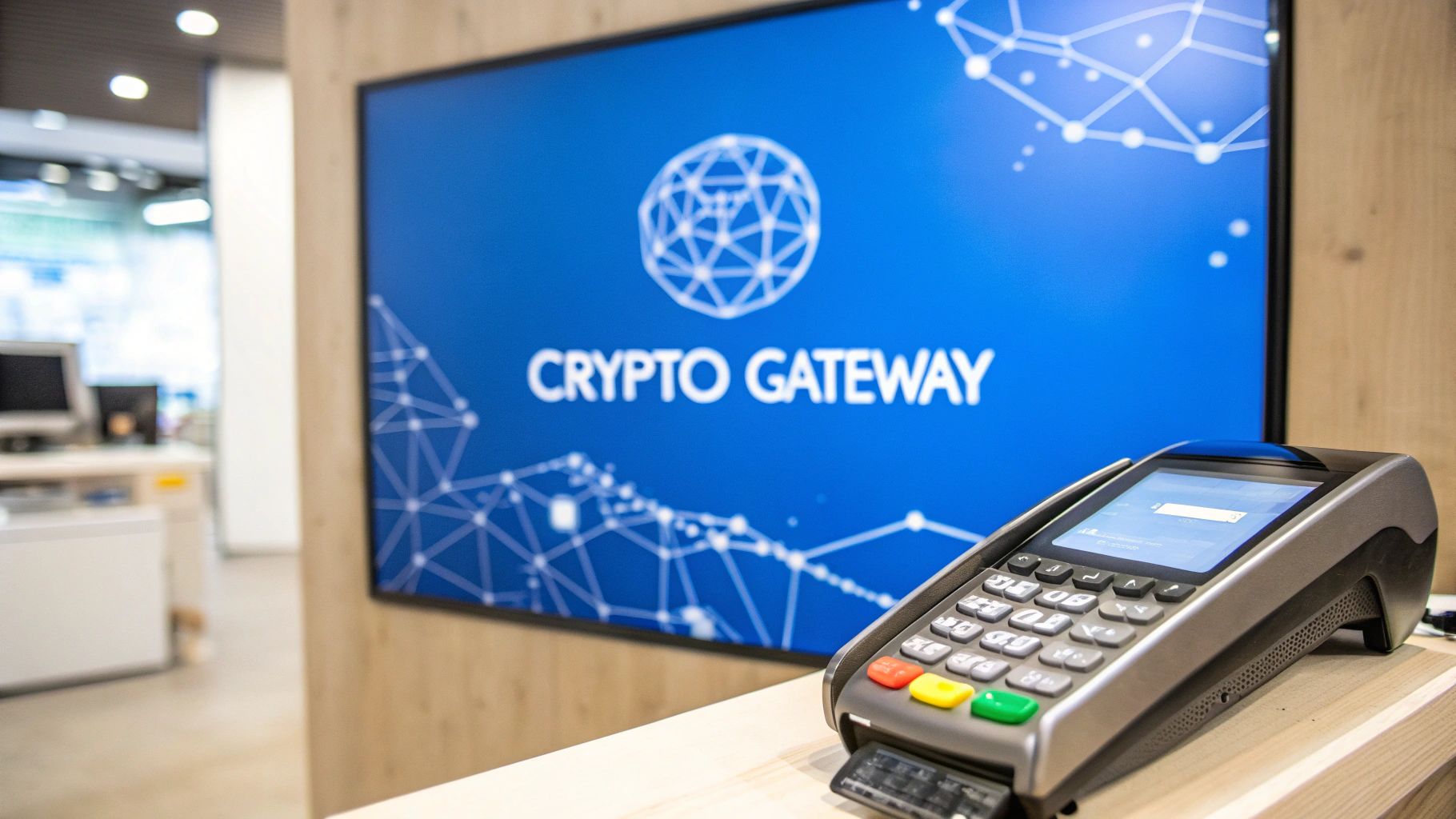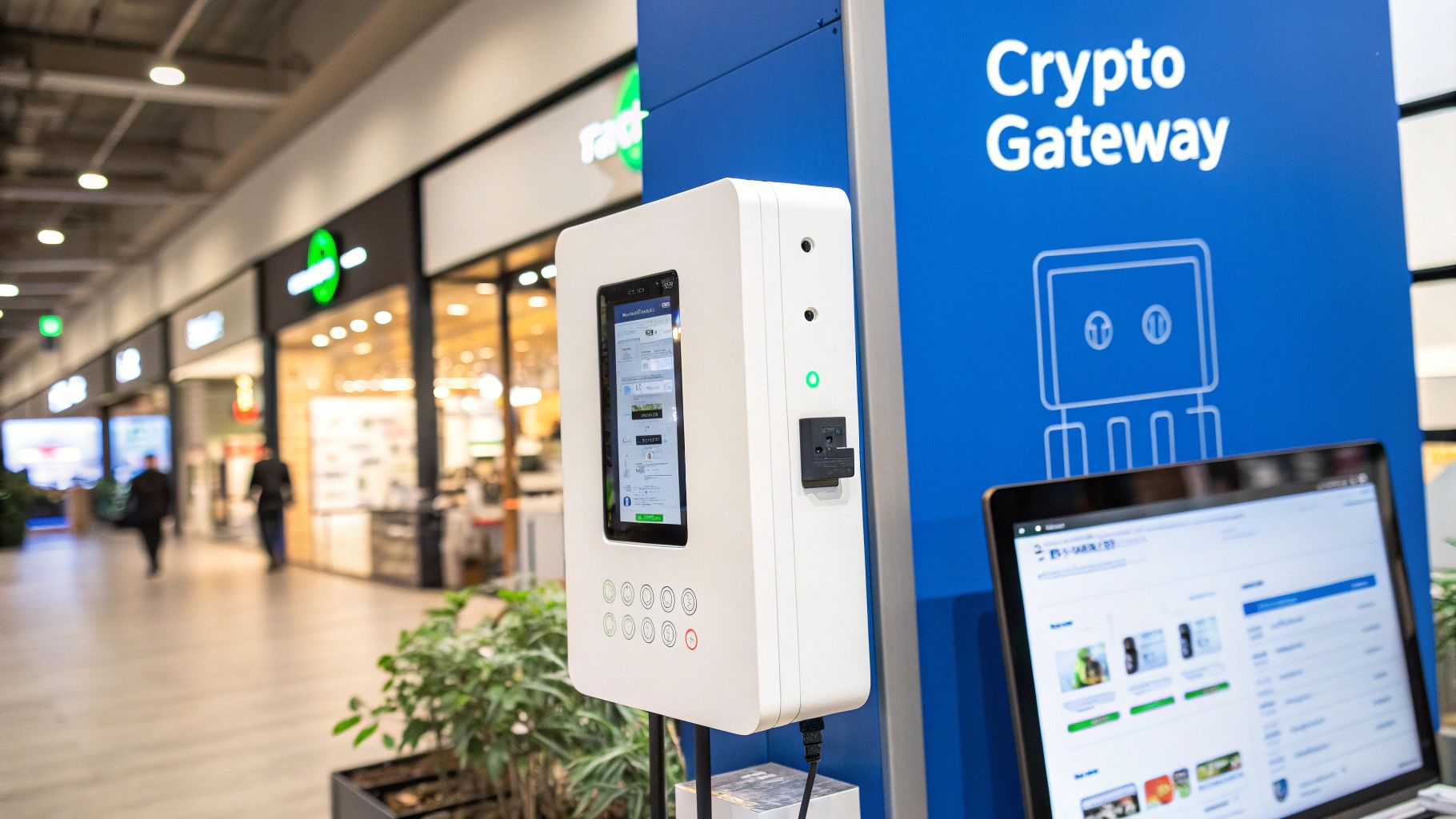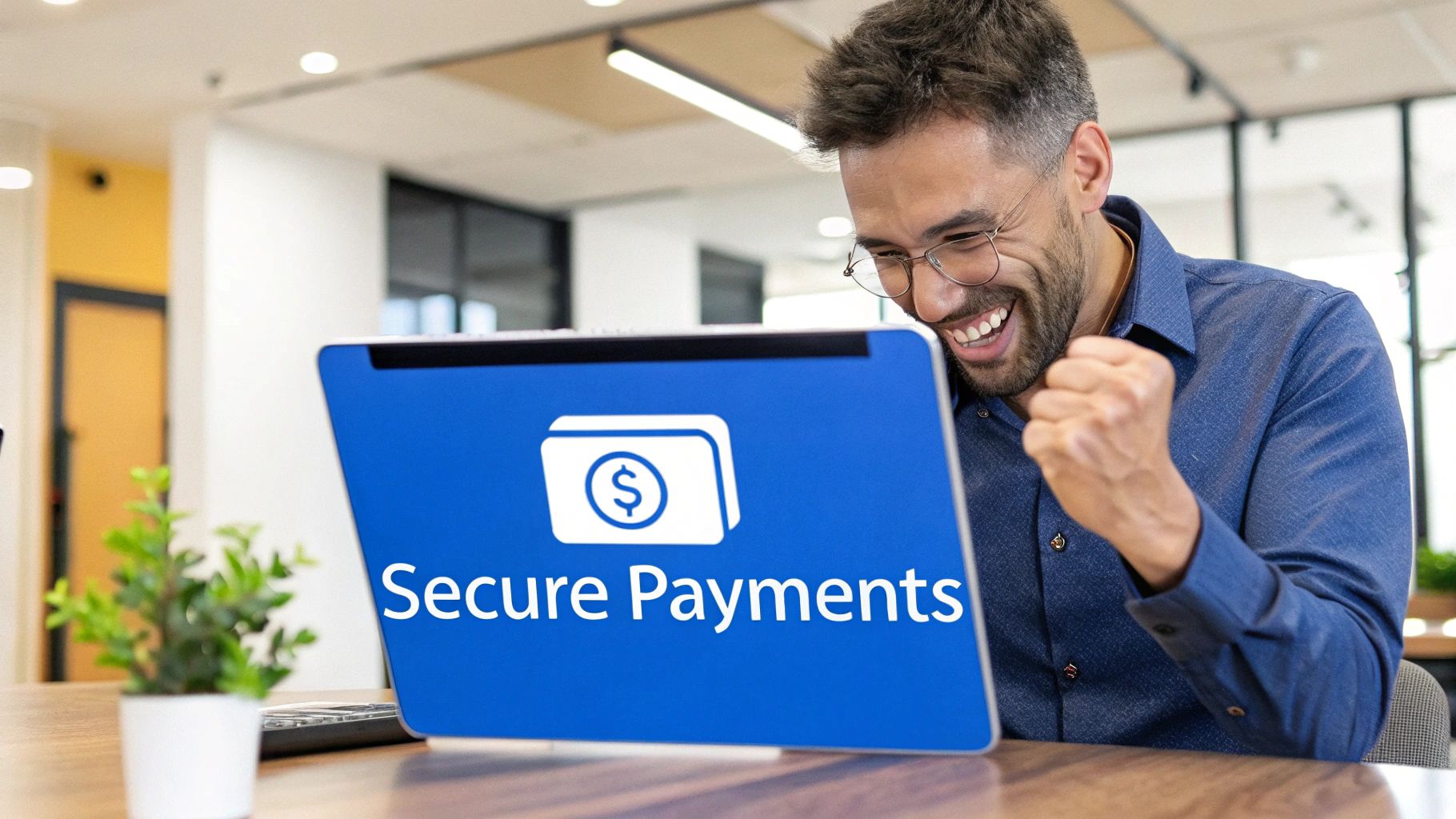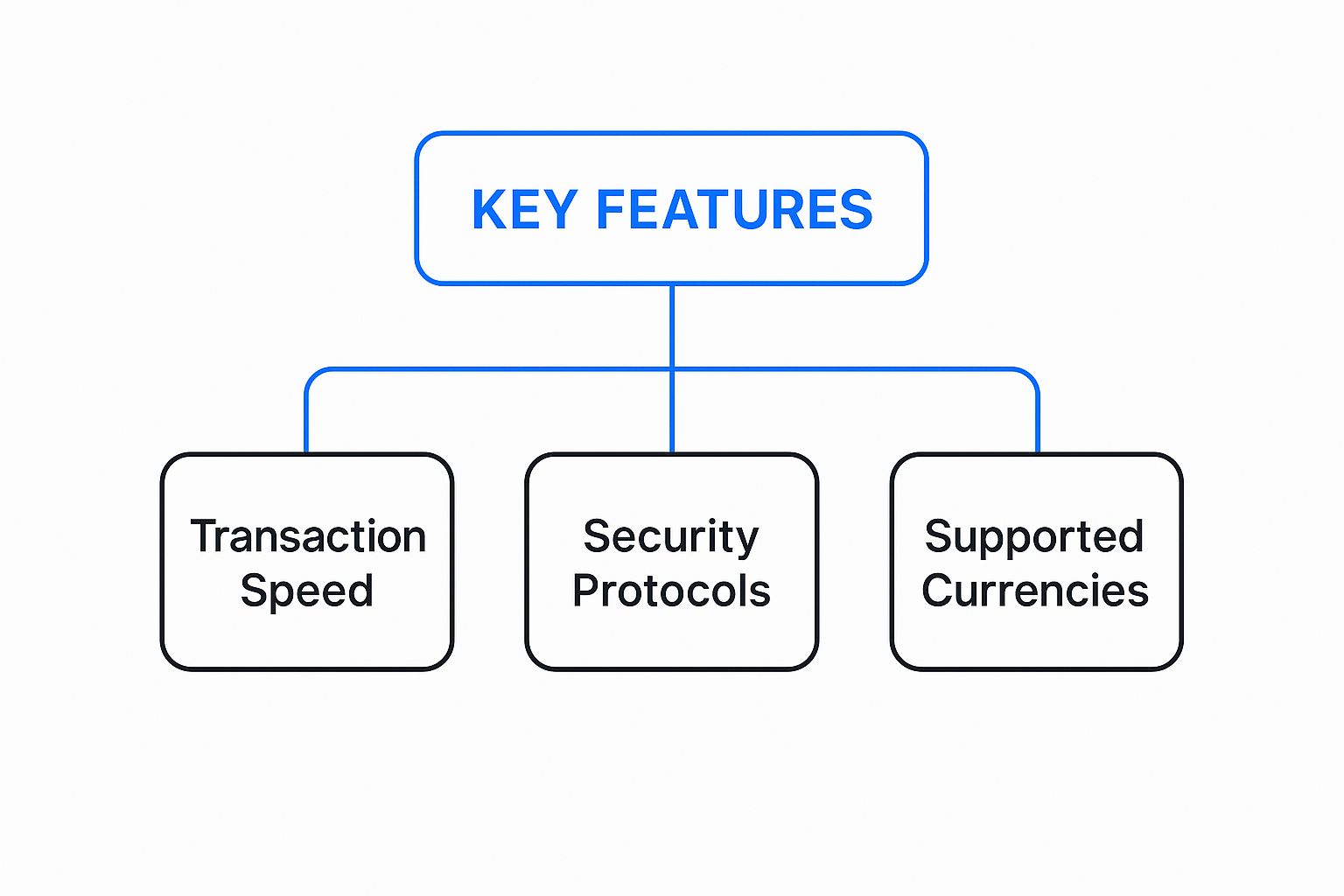Finding the Best Crypto Payment Gateway for Your Business

Welcome to the future of digital money. For a long time, cryptocurrency felt like a niche investment, something talked about by tech enthusiasts. But that's changing. Businesses are now on the hunt for payment options that are faster, cheaper, and work anywhere in the world, pushing crypto into the mainstream as a real tool for buying and selling.
This guide is your map. We'll break down what crypto payment gateways are, why they're becoming so important, and how you can pick the right one for your business.
What Is a Crypto Payment Gateway?

Simply put, a crypto payment gateway is a service that lets businesses accept digital currencies like Bitcoin or Ethereum as easily as they take a Visa or Mastercard.
Think of it as a financial bridge. It connects your everyday business operations to the decentralized world of the blockchain, but it handles all the complicated tech stuff for you. You don't need to be a blockchain wizard to use one.
When a customer gets to your checkout and wants to pay with crypto, the gateway takes over. It gives them a simple payment option, usually a QR code, and handles confirming the transaction on the blockchain. For you, the business owner, the process is seamless.
A Simple Analogy
Imagine you run an online shop in the US and someone from Japan wants to buy a product. They have Japanese Yen, but you need US Dollars. A credit card processor or a service like PayPal acts as the middleman, automatically converting their Yen into your Dollars.
A crypto payment gateway does the exact same thing, just with digital currencies. Your customer pays with their Bitcoin, and the gateway can instantly swap it for your local currency (like USD or EUR) before dropping it into your bank account. This completely shields you from the price swings that cryptocurrencies are known for.
Why This Matters for Modern Business
The rise of digital currencies isn't just a trend; it's a huge opportunity. Crypto gateways are at the center of the recent advancements in payment solutions that are changing how we think about money. By adding one to your business, you can unlock some serious advantages.
- Go Global Instantly: Cryptocurrencies don't care about borders. You can accept payments from anyone, anywhere, without waiting days for international bank transfers or paying steep fees.
- Keep More of Your Money: Traditional credit card fees can eat up 2-4% of every sale. Crypto gateway fees are often much lower, usually hovering around 1% or less. That's more profit in your pocket.
- Say Goodbye to Chargeback Fraud: Once a blockchain transaction is confirmed, it's final. This practically wipes out the risk of fraudulent chargebacks, a massive headache and expense for many online businesses.
These gateways make it not just possible but practical for any business to tap into this growing global market. They handle the tricky parts—the conversions, the security, the tech—so you can focus on what you do best.
How a Crypto Payment Gateway Actually Works

So, what’s really going on under the hood?
Think of a crypto payment gateway as a sophisticated translator. It sits between your customer's crypto wallet and your business bank account, instantly converting their digital currency into the cash you actually use, like US dollars or Euros.
This little bit of magic means you don't have to wrestle with the complexities of the blockchain. For your customer, it’s just a smooth, simple checkout. For you, it’s business as usual. The gateway handles all the heavy lifting, making sure the entire process is secure and straightforward for everyone involved.
The Step-by-Step Transaction Flow
Even though the technology is complex, the process your customer sees is incredibly simple. From start to finish, the whole thing usually wraps up in just a few seconds, unfolding in four main steps.
- Kicking Off the Payment: Your customer hits the checkout and chooses to pay with crypto. Instantly, the gateway creates a unique payment request for that specific order, usually popping up as a QR code and a crypto wallet address.
- Locking in the Rate: This part is crucial. The second the payment is started, the best crypto payment gateway freezes the exchange rate for a short window, typically about 10-15 minutes. This is a game-changer because it protects you completely from crypto's infamous price swings. You're guaranteed to get the exact dollar amount you charged.
- The Customer Pays: Your customer simply scans the QR code with their crypto wallet app or copies the address and sends the exact amount. That's it. Their wallet sends the transaction out onto the blockchain network.
- Confirmation and Payout: The gateway watches the blockchain for the transaction to be confirmed. As soon as it’s verified, your system gets the green light, and the gateway converts the crypto into your preferred currency. The funds are then deposited straight into your bank account.
Thanks to this automated flow, you never have to personally touch or manage volatile cryptocurrencies—unless, of course, you want to.
The demand for this technology is exploding. The global crypto payment gateway market is on track to hit around $5.5 billion by 2025, growing at a blistering pace of over 20% each year. This isn't surprising when you consider there are now more than 420 million crypto owners worldwide looking for practical ways to use their digital assets. You can discover more market insights on Sensepass.
A Quick Peek Behind the Curtain
While the checkout feels seamless, the gateway is performing some seriously complex work in the background. It’s constantly talking to the blockchain, encrypting transaction data, and running checks to prevent fraud or common errors like double-spending.
For instance, if a customer pays with Ethereum, the gateway is listening directly to the Ethereum network. It waits for the transaction to get a certain number of "confirmations"—which is how the network agrees that the payment is legitimate—before it tells your store the order is paid.
This built-in verification is what makes crypto transactions so secure and permanent, virtually wiping out the risk of chargeback fraud. By shouldering all this technical weight, the gateway frees you up to focus on running your business, not on becoming a blockchain expert.
What to Look For in a Great Crypto Payment Gateway
When you start digging into crypto payment gateways, you'll quickly realize they aren't all created equal. Picking the right one isn't about finding some magical "best" option, but about finding the one that fits your business like a glove. The real difference between a basic processor and a true business asset comes down to a handful of critical features.
Let's break down what separates the good from the great.

As you can see, it all boils down to a few core pillars: how fast transactions are, how secure your funds are, and how many different customers you can serve. These are the foundations that directly impact your efficiency and how far your business can reach.
Bulletproof Security Protocols
Let's be clear: when money is involved, security is everything. While blockchain has its own built-in safeguards, the gateway you use adds another critical layer of defense. You need to be sure that layer is rock-solid. The best providers do more than just the basics to protect your funds and your customers' data.
Keep an eye out for features like two-factor authentication (2FA) and multi-signature wallets. It's also worth asking how they handle your funds. A non-custodial gateway, for example, lets you keep control of your own private keys. That means you, and only you, have full control over your money—a huge plus for security.
One of the biggest wins with crypto payments is that chargeback fraud practically disappears. Once a transaction is confirmed on the blockchain, it’s final. This protects merchants from the costly and frustrating chargebacks that plague credit card sales.
Support for Multiple Coins and Fiat Currencies
To open your doors to the global crypto community, your gateway needs to be flexible. That means going beyond just Bitcoin. You want to see support for a wide range of popular coins like Ethereum, USDT, and whatever else your customers are actually using. A provider that can handle 70+ different digital currencies gives you a much bigger playing field than one that only offers a few.
Just as important is what happens after the payment. The best crypto payment gateways will instantly convert that crypto into your local currency, like USD or EUR, and lock in the exchange rate. This is a game-changer because it takes all the risk of price volatility off your shoulders. You get the exact amount you charged, every single time.
Smooth and Simple Integration
A new payment system should make your life easier, not give you another technical headache. How easily a gateway plugs into your existing website or sales process is a massive consideration. Top-tier solutions offer a few different ways to get set up, so you can pick what works for you.
- API Integration: If you have a developer on hand, a well-documented API gives you the power to build a completely custom checkout that matches your brand's look and feel.
- E-commerce Plugins: Using a platform like WooCommerce or Shopify? Look for pre-built plugins that let you start accepting crypto in just a few clicks—no coding needed.
- Payment Links and Buttons: For a super simple approach, payment links or invoices let you accept crypto without any complex setup. This is perfect for freelancers, service providers, or anyone selling on social media.
When you're evaluating your options, a clear, side-by-side comparison can make all the difference. This table breaks down the essential features and what they really mean for your day-to-day operations.
Essential Features Comparison for Crypto Gateways
| Feature | Why It Matters for Your Business | What to Look For |
|---|---|---|
| Security Protocols | Protects your revenue and customer data from theft and unauthorized access. Builds trust with your clientele. | 2FA, multi-signature wallets, non-custodial options, cold storage for funds. |
| Multi-Currency Support | Expands your potential customer base globally by allowing people to pay with their preferred cryptocurrency. | Support for a wide range of popular and stablecoins (e.g., BTC, ETH, USDT, USDC). |
| Fiat Conversion | Shields you from crypto price volatility, ensuring you receive the exact sale amount in your local currency. | Automatic, real-time conversion to currencies like USD, EUR, or GBP at a locked-in rate. |
| Integration Ease | Determines how quickly and easily you can start accepting payments without disrupting your existing workflow. | Well-documented APIs, pre-built e-commerce plugins, and simple payment links/invoices. |
| Fee Structure | Directly impacts your profit margins. Unclear fees can eat into your revenue unexpectedly. | A single, transparent transaction fee (typically 0.5%-1%). No hidden setup or monthly costs. |
| Customer Support | Ensures you have help when you need it most, whether it's a technical issue or a simple question. | Responsive support available through multiple channels (email, chat, phone). |
Ultimately, the goal is to find a partner whose features not only meet your current needs but can also scale with you as your business grows.
Clear and Competitive Fees
Finally, let's talk about cost. One of the main reasons businesses move to crypto is to lower transaction fees. Traditional credit card processors can take a hefty 2-4% cut on top of other fixed fees. In contrast, most crypto gateways charge a straightforward transaction fee, usually somewhere between 0.5% and 1%.
Make sure you read the fine print. Are there hidden setup fees, withdrawal charges, or monthly minimums? The best providers are upfront about their pricing with a simple, all-inclusive rate. That way, you can easily predict your costs and keep more of your hard-earned money.
Thinking about adding a new payment method can feel purely technical, but when it comes to cryptocurrency, the decision impacts your entire business. For companies with an eye on the future, a crypto payment gateway is much more than another button at checkout. It’s a strategic move to boost profits, reach new customers, and get ahead of the curve.
And the momentum is undeniable.
The global market for crypto payment gateways is on a tear, expected to jump from $1.69 billion in 2024 to $2.02 billion in 2025—that's a compound annual growth rate of roughly 19.5%. Experts predict it will hit $4.07 billion by 2029, as regulations become clearer and Web3 continues its march into the mainstream. You can dig into the full market analysis from The Business Research Company to see the numbers for yourself.
This isn't just hype. This growth is happening because real businesses are seeing real benefits. Let's break down what makes accepting crypto such a smart move.
Slash Your Transaction Fees
Let’s start with the most direct impact on your bottom line: the fees. If you accept credit cards, you know the drill. Processors take a slice of every sale, typically anywhere from 2% to 4%, not to mention other hidden monthly or fixed charges. That’s a significant chunk of your revenue gone before it even hits your bank account.
Crypto flips that script. The fees for the best crypto payment gateway services are a world apart, usually sitting between 0.5% and 1%. That difference means more money stays in your pocket with every single sale. For a business with decent volume, we’re talking about thousands of dollars saved every year—cash you can put right back into growing your company.
Think about it: a business processing $100,000 in monthly sales could save between $1,500 and $3,000 every month just by switching from cards to crypto. That's a direct boost to your profits, no extra work required.
Go Global in an Instant
Cryptocurrency doesn't care about borders, which makes it a phenomenal tool for selling internationally. Traditional cross-border payments are a headache—they’re slow, crawling through layers of banks for days, and get hit with hefty currency conversion fees along the way. It’s a clunky experience for your customer and a drag on your cash flow.
Crypto payments cut right through all that complexity. Transactions settle on the blockchain almost instantly, whether your customer is next door or on the other side of the planet.
This gives you two huge advantages:
- Get Paid Faster: Your money arrives in minutes or hours, not days. This massively improves your cash flow and operational agility.
- Reach Anyone, Anywhere: You can tap into new markets without the nightmare of setting up international bank accounts. Your store is suddenly open to a global audience.
Connect with a Whole New Audience
When you start accepting digital currencies, you’re not just adding a payment option; you’re sending a signal. You’re telling a growing, tech-forward community that you’re one of them. The global crypto community is filled with engaged, often affluent customers who actively look for and support businesses that embrace their world.
For many, paying with crypto isn't a novelty—it's a preference. By offering it, you set yourself apart from the competition and attract a new wave of customers who might have otherwise scrolled right past you. This is especially true if you’re in gaming, tech, or sell digital goods, where your customers are already living in that ecosystem.
Say Goodbye to Chargeback Fraud
If you’ve ever run an online store, you know the pain of chargebacks. A customer buys something, receives it, and then disputes the charge with their credit card company, forcing a refund. It's a system ripe for fraud, costing you not just the sale but also your time and sanity.
This is where the blockchain’s core design becomes a business owner’s best friend. Crypto transactions are irreversible. Once a payment is confirmed on the network, it’s final. It cannot be clawed back by the sender.
For your business, this is a game-changer. It effectively eliminates the risk of fraudulent chargebacks, giving you the security and peace of mind that a sale is truly a sale.
How to Choose the Right Crypto Payment Gateway

Picking a crypto payment gateway isn't about grabbing the first one you see. It’s more like choosing a business partner—one that needs to fit your company's goals, your daily workflow, and the people you sell to. Getting this right means you’re not just tacking on a new payment option; you're making a smart investment in your business's future.
Before you even start looking at providers, the first step is to look inward. Seriously, take a moment to map out what you actually need. How many transactions do you handle? Who are your customers, and what coins are they likely to own? What e-commerce platform or POS system are you already using?
Answering these questions first gives you a personalized shopping list. This simple exercise cuts through the noise and turns a confusing search into a focused hunt for the provider that checks all your boxes.
Assess Your Technical and Operational Needs
The first big question is how a new gateway will play with your existing tech. A smooth integration is an absolute must. A clunky one will just create headaches for your team and a frustrating checkout experience for your customers.
Be realistic about your technical firepower. Do you have a developer on hand ready to dig into an API for a fully custom, branded experience? Or do you need something you can plug into your Shopify or WooCommerce store in a few minutes with no coding required?
Beyond the tech, think about how you want to manage your funds. Are you looking for a system that instantly converts every crypto payment to fiat to protect you from price swings? Or would you prefer a non-custodial gateway like ATLOS, which puts you in complete control of your private keys and lets you hold crypto if that’s your strategy?
Compare Providers on Core Criteria
With your own needs clearly defined, you can start sizing up the competition. Zero in on the few key areas that will have the biggest impact on your operations and your bank account.
- Security and Compliance: This is non-negotiable. Look for providers that use multi-signature wallets, require two-factor authentication (2FA), and can prove they've passed independent security audits. Make sure they comply with the financial regulations in the countries you operate in.
- Fee Structure: Get granular with the costs. The best gateways have a transparent, flat transaction fee, usually somewhere between 0.5% and 1%. Watch out for sneaky hidden charges like setup fees, monthly minimums, or withdrawal costs that can slowly chip away at your revenue.
- Customer Support: When a payment hits a snag, you need help, and you need it fast. Check out the provider's support reputation. Do they offer 24/7 help? Can you reach them through chat, email, and phone? A dedicated, responsive support team is worth its weight in gold.
The right gateway does more than just process payments; it becomes a partner in your growth. A solution like ATLOS sets a high bar with its easy-to-use interface, competitive fees, and solid support, showing what businesses should really expect from a top-tier provider.
Evaluating the Broader Market Context
It also helps to understand where these providers sit in the bigger picture. The crypto payment gateway market is a key piece of the massive global payment industry, which was valued at $42.68 billion in 2024 and is expected to hit $146.28 billion by 2030. Heavyweights like Coinbase Commerce, PayPal, and Crypto.com Pay control over 34% of the crypto gateway market, thanks to their brand recognition and global footprint. You can discover more insights about the payment gateway market on NextMSC.
Knowing this helps you navigate your options. While the big names offer a sense of security, specialized providers like ATLOS often provide more focused solutions. They cater to specific needs, like those of high-risk merchants or DAOs, who need features like no-KYC onboarding to get up and running quickly.
In the end, choosing the best crypto payment gateway is all about finding the right fit. By taking the time to understand your own needs, comparing providers on what truly matters, and seeing the lay of the land, you can make a choice you’ll be confident in for years to come.
Answering Your Questions About Crypto Payments
Diving into the world of crypto can feel like learning a new language, so it's completely normal to have questions. For business owners, those questions usually boil down to security, stability, and whether it’s actually practical. Let's tackle these head-on so you can feel confident about adding crypto to your payment options.
This section breaks down the most common questions we hear from business owners who are thinking about using a crypto payment gateway.
Is Accepting Cryptocurrency Safe for My Business?
Yes, it is. In fact, in some respects, it’s even safer than traditional payments, as long as you're using a reliable gateway. These platforms are designed to handle all the complex technical stuff for you, using advanced security like multi-layer encryption to protect every transaction. This takes the direct risk off your plate.
The biggest security win, though, comes from how the blockchain works. Once a transaction is confirmed, it's final. That means the frustrating and expensive problem of chargeback fraud—a constant headache with credit cards—is virtually eliminated.
How Do We Handle Crypto Price Volatility?
This is easily the most common concern, and it's a valid one. But the best crypto payment gateways have a brilliant solution. The moment a customer pays, the gateway locks in the exchange rate for a brief window. This ensures you receive the exact fiat amount of the sale, regardless of what the crypto market does next.
So, if you sell a product for $100, you get $100. Period. The gateway absorbs the volatility risk by immediately converting the crypto into USD, EUR, or whatever currency you prefer. You’re completely shielded from the market swings.
By automatically converting funds, modern gateways remove the biggest barrier for merchants. You gain all the benefits of accepting crypto—lower fees, global reach—without having to manage or speculate on volatile assets yourself.
What Are the Typical Fees for a Crypto Gateway?
This is where crypto really shines. Credit card processors typically hit you with fees of 2-4%, plus other hidden monthly or fixed charges. Crypto gateways are far more transparent and affordable. Most of the top providers charge a single, straightforward transaction fee, often just 1% or less.
This simple pricing model means more of your revenue stays in your pocket. Setup fees are rare, and the overall cost is significantly lower, making it a great way to improve your profit margins.
When considering the practicalities of accepting crypto, a common concern for businesses is understanding the tax implications of cryptocurrency. It’s an important area to research as you integrate this new payment method.
Is the Checkout Process Complicated for Customers?
Not in the slightest. A good crypto payment gateway is obsessed with making the user experience smooth and intuitive. The checkout process is designed to feel as easy as using PayPal or Apple Pay.
Here’s a quick look at how it works:
- Your customer chooses the crypto payment option at checkout.
- They select the specific cryptocurrency they want to pay with.
- A unique QR code and wallet address pop up. They simply scan the code or copy the address with their own crypto wallet to send the funds.
The whole thing is fast and familiar for anyone who already uses crypto, and it doesn’t require any technical know-how from your customers.
Ready to unlock the benefits of secure, low-fee, global payments? ATLOS offers a powerful yet simple crypto payment gateway that lets you start accepting crypto today with no KYC and full control over your funds. Discover how easy it can be to future-proof your business at https://atlos.io.